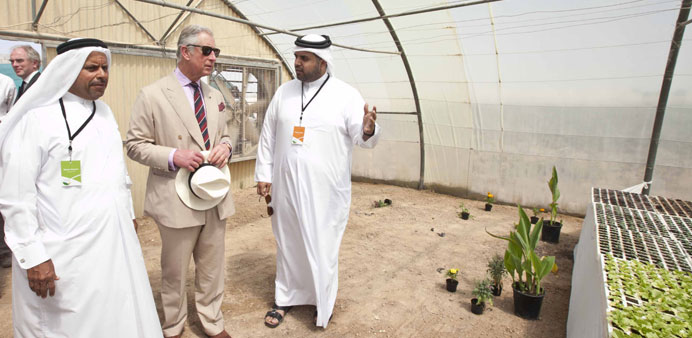From left: Nassir bin Ali al-Kuwari, Prince Charles of Wales and Fahad bin Mohamed al-Attiya.
PICTURE: QNFSP/Adrian Haddad
The issue of food and water security in Qatar must be addressed with co-ordinated and integrated national planning to build a foundation for long-term growth and progress, Qatar National Food Security Programme (QNFSP) Executive Chairman Fahad bin Mohamed al-Attiya asserted during the visit of Prince Charles of Wales to Al Safwa Farm.
On Friday morning, Prince Charles concluded his Qatar visit with a tour of the farm owned and operated by Nassir bin Ali Khamis al-Kuwari and his family. The farm, located just outside Doha, provided an ideal backdrop for a discussion on the food and water security challenges facing the rapidly-growing Gulf state.
Sustainable development, environmental protection and healthy local food supplies through responsible farming are issues close to the heart of Prince Charles.
Al-Kuwari was joined by al-Attiya and a group of experts who provided Prince Charles and the accompanying British delegation with a hands-on tour of innovative and sustainable agricultural techniques being used by the al-Kuwari family on their farm.
As a coastal dry land nation on the Arabian Gulf, Qatar stands particularly vulnerable to the increasing global concern of secure access to a healthy and safe food supply. The nation is more than 99% dependent on desalination for its freshwater supplies and currently has just over 67 hours of potable water storage capacity.
Qatar imports 93% of its food from a relatively limited number of sources internationally and is regularly exposed to supply interruptions, volatile prices, market competition and reduced quality and safety of imported foods.
“The State of Qatar and Qatari companies continue to innovate and invest to bring new suppliers and sources of food to the local market, but the challenge of resilient and long-term food security for dry land nations such as Qatar goes beyond what independent development and investment strategies can resolve alone,” said al-Attiya. “Systemic challenges require systemic responses. We must work across all sectors to develop and implement sustainable solutions that co-ordinate national infrastructure improvements, build on international investment and diplomacy, engage local communities and boost innovative and sustainable domestic agriculture.”
The QNFSP executive chairman continued, “An integrated national master plan that includes collaboration globally, domestic agriculture and increased capacity for processing and storage will do more than just boost national resiliency and ensure the opportunity for ongoing growth and progress. It fulfils Qatar’s National Vision of building a ‘knowledge-based economy’ by fostering innovation in new practices and technologies desperately needed by the more than 2bn people living in arid and water-stressed regions across the world.”
Prince Charles joined al-Kuwari for a walk through the fields and greenhouses of Al Safwa Farm. The two discussed at length the importance of local production in connecting people to the land, community and a healthy lifestyle.
Al-Kuwari shared with Prince Charles his concerns over future access to water supplies for agriculture if steps are not taken to provide alternatives to rapidly depleting groundwater supplies. They also discussed the importance of long-term planning in boosting research, development of better practices and progress on market and pricing models that encouraged the responsible use of resources.
The tour concluded with a discussion in the majlis of the al-Kuwari farmhouse. Al-Attiya and QNFSP Vice-Chairman Sheikh Hamad bin Ali bin Jassim al-Thani were joined in the discussion by local researchers and experts as well as the farm’s founder, Ali bin Khamis al-Kuwari, and his sons.
With the view of Al Safwa’s fields around them and a display of local produce from the nearby farmers’ market, the group shared with Prince Charles how feedback from local farmers dealing with current challenges and the input from 17 task force members were shaping a national master plan for food and water security.
“The food and agricultural price shocks of 2008 were a clear signal for Qatar,” recounted al-Attiya.
In 2008, HH the Heir Apparent Sheikh Tamim bin Hamad al-Thani gathered a task force from across all sectors and set out a mandate to develop an integrated national master plan that would set a responsible and co-ordinated course for increased resiliency for Qatar in the face of these challenges.
The QNFSP was empowered to build on the input of the task force and continue developing the framework of the national master plan and its related policy recommendations. Since then, the QNFSP has worked with researchers, local producers and global experts to deliver its “discovery” and “proof of concept” phases. It is slated to deliver its next phase of development on the national master plan in the third quarter of this year.
“Farming in Qatar is a very hard thing today,” al-Attiya told Prince Charles. “But a simple walk through the fields and greenhouses of a farm like the one the al-Kuwari family has built here is enough to inspire anyone that we can certainly do better and produce more if we innovate and plan responsibly.”
“We can balance smart growth and development with the responsibility we have to future generations to build a safe, healthy and resilient place to call home,” al-Attiya added. “And we can achieve this in ways that combine both responsible international collaboration and local agricultural production to put safe and healthy food on our families’ tables.
“By working together, we can build a nation that has the flexible and resilient capacity to guarantee safe water in our drinking glasses and fresh, affordable and healthy foods in our markets. Such long-term capacity development requires careful, responsible investment and planning, but it can and must be done.”

